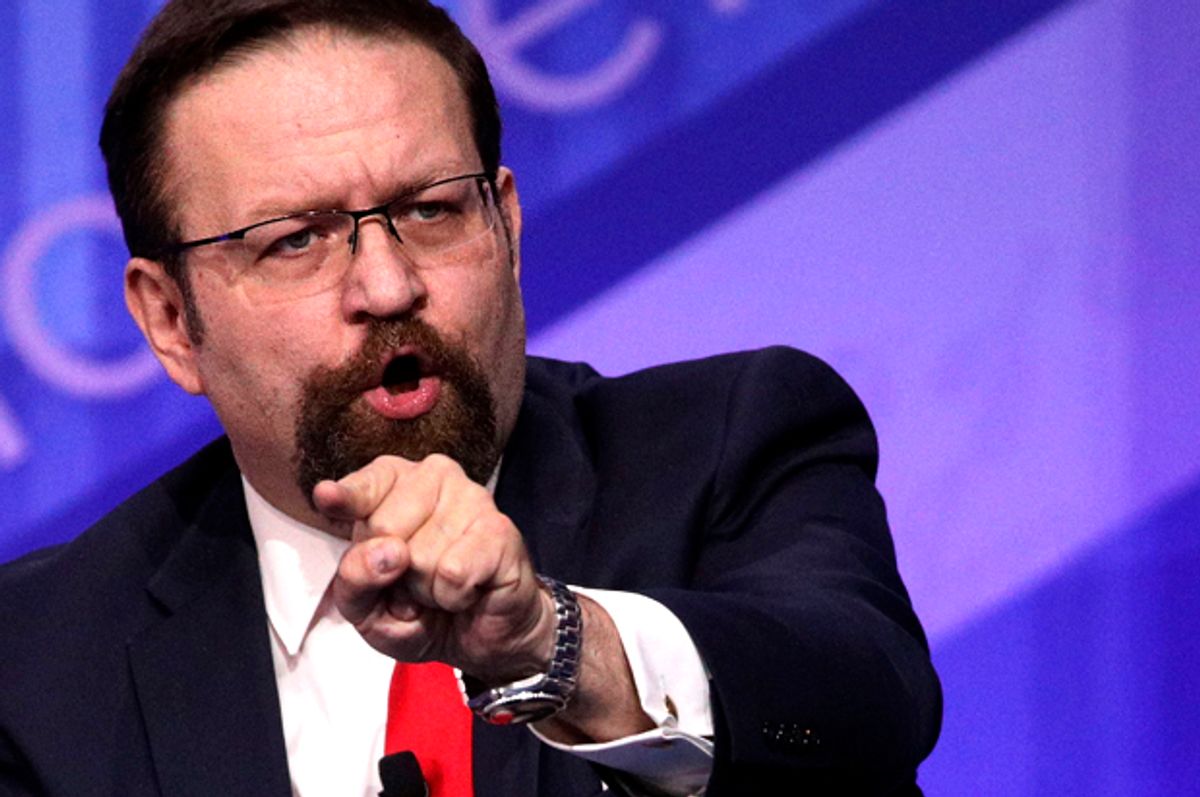Sebastian Gorka, who served as an adviser to President Donald Trump until August, appeared on Sean Hannity's show to denounce the NFL protests, using language that was eerily reminiscent of fascist logic.
"The red of that flag, the stripes in that flag, that's the same red as the blood of Americans that fought and died for this nation," Gorka told lawyer Daryl Parks.
The choices of red, white and blue for the American flag did not have any meaning when the flag was adopted in 1777, although the red in the United States seal was meant to represent "hardiness & valour" — not blood. But using red as a metaphor for blood was evocative of the chants of "blood and soil," which was used by the Nazi Party during the Third Reich. More recently, it was used by Charlottesville, Virginia, protesters, who argued that a nation's strength is determined by the blood (race) of its inhabitants.
Gorka also insisted that football players who protest the flag and anthem aren't loyal to America, a sentiment contradicted by the First Amendment.
"If you can't see the flag and the anthem as symbols of unity, but political tools, then perhaps you should think again about which country you're loyal to," Gorka declared.
Gorka followed that remark by mentioning that people of all races had died for their country, but the dog whistle was clear. It certainly didn't help that when he then tried to list places where African-American soldiers died alongside their white counterparts, he neglected to mention that during one of those examples, the invasion of Normandy, the military was still segregated.
Gorka also went on a prolonged rant conflating "supporting the flag" with "unity," and threw red meat to Trump supporters by playing up the urban-rural divide:
When you see those caskets come home from the battlefields, with dead American soldiers and Marines in them, do we think about that flag having a skin color? Do we think about that flag belonging to a political party? Is it the GOPs' flag? Is it the Democrats' flag? Does it belong to the urban cities? Does it belong to the derisively called flyover states? No.
None of those dead Americans are honored by the flag in partisan ways. They're honored because the flag is a symbol of our nation. It is a symbol of our unity, and if you don't want to have a unitary nation, then you don't have a nation. If you don't respect the flag, then you don't respect the lives of the people who died for that nation. It's that simple.
Gorka's denunciation of "urban cities," in addition to being a racist dog whistle (with "urban" often being code for "black"), could also have been a play off a popular Nazi trope associated with the "blood and soil" rhetoric. Nazi propaganda associated Jews with the cities. They blamed the decline of rural Germany — which they touted as the backbone of their country — on the Jewish/urban influence. Hence the reference to the notion that people from the cities "derisively" think of rural America as "flyover country."
As a premier Nazi "Blood and Soil" ideologist (and the future German minister of agriculture from 1933 to 1942) said during a 1930 speech on the subject: "In such a state (as Germany) the German farmer is the cornerstone of the state's policy. That should not only mean that agricultural romanticism should be promoted, but rather that the laws of blood and soil must find their point of reference as a top priority."
As CNN later noted:
Many rural farmers identified with the Nazis' blood and soil rhetoric, and it instilled a deep sense of national pride in poorer and agricultural populations.Some Nazi propaganda also insisted that most Jewish people were merchants -- stereotyping the population as distinctly opposite from the "blood and soil" German farmers.
In more modern times, Trump used a presidential debate to say that inner cities were "hell" for minorities.
Gorka, who said in August that he resigned from the White House because they were undermining Trump's "Make America Great Again" platform, has a long history of connections to Hungarian far right groups. These include the violently racist and anti-Semitic militia Magyar Gárda and the anti-Semitic political party Jobbik.

Shares